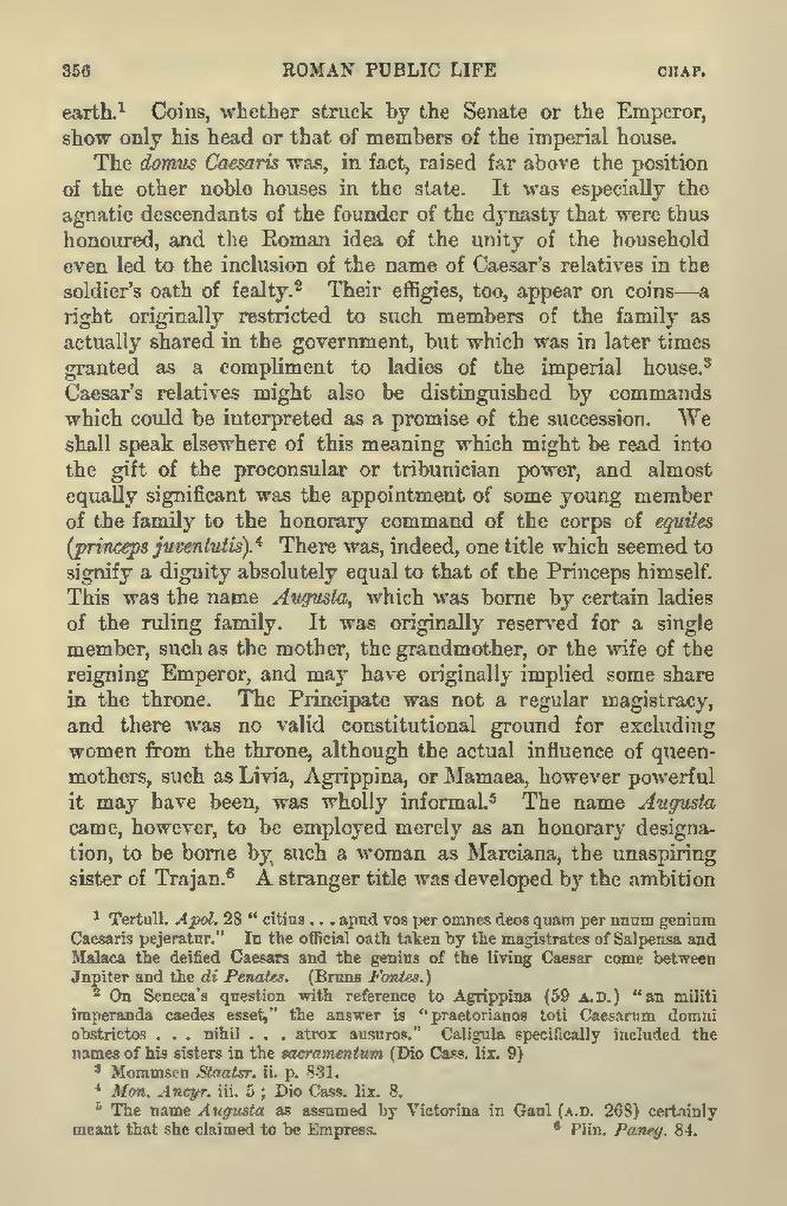earth.[1] Coins, whether struck by the Senate or the Emperor, show only his head or that of members of the imperial house.
The domus Caesaris was, in fact, raised far above the position of the other noble houses in the state. It was especially the agnatic descendants of the founder of the dynasty that were thus honoured, and the Roman idea of the unity of the household even led to the inclusion of the name of Caesar's relatives in the soldier's oath of fealty.[2] Their effigies, too, appear on coins—a right originally restricted to such members of the family as actually shared in the government, but which was in later times granted as a compliment to ladies of the imperial house.[3] Caesar's relatives might also be distinguished by commands which could be interpreted as a promise of the succession. We shall speak elsewhere of this meaning which might be read into the gift of the proconsular or tribunician power, and almost equally significant was the appointment of some young member of the family to the honorary command of the corps of equites (princeps juventutis).[4] There was, indeed, one title which seemed to signify a dignity absolutely equal to that of the Princeps himself. This was the name Augusta, which was borne by certain ladies of the ruling family. It was originally reserved for a single member, such as the mother, the grandmother, or the wife of the reigning Emperor, and may have originally implied some share in the throne. The Principate was not a regular magistracy, and there was no valid constitutional ground for excluding women from the throne, although the actual influence of queen-mothers, such as Livia, Agrippina, or Mamaea, however powerful it may have been, was wholly informal.[5] The name Augusta came, however, to be employed merely as an honorary designation, to be borne by such a woman as Marciana, the unaspiring sister of Trajan.[6] A stranger title was developed by the ambition
- ↑ Tertull. Apol. 28 "citius . . . apud vos per omnes deos quam per unum genium Caesaris pejeratur." In the official oath taken by the magistrates of Salpensa and Malaca the deified Caesars and the genius of the living Caesar come between Jupiter and the di Penates. (Bruns Fontes.)
- ↑ On Seneca's question with reference to Agrippina (59 A.D.) "an militi imperanda caedes esset," the answer is "praetorianos toti Caesarum domui obstrictos . . . nihil . . . atrox ausuros." Caligula specifically included the names of his sisters in the sacramentum (Dio Cass. lix. 9)
- ↑ Mommsen Staatsr. ii. p. 831.
- ↑ Mon. Ancyr. iii. 5; Dio Cass. lix. 8.
- ↑ The name Augusta as assumed by Victorina in Gaul (A.D. 268) certainly meant that she claimed to be Empress.
- ↑ Plin. Paneg. 84.
